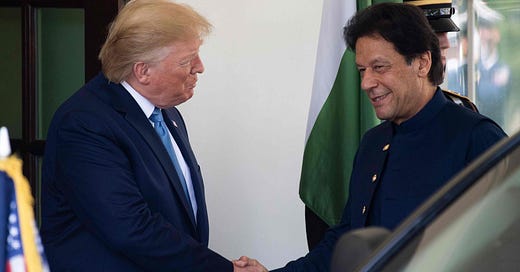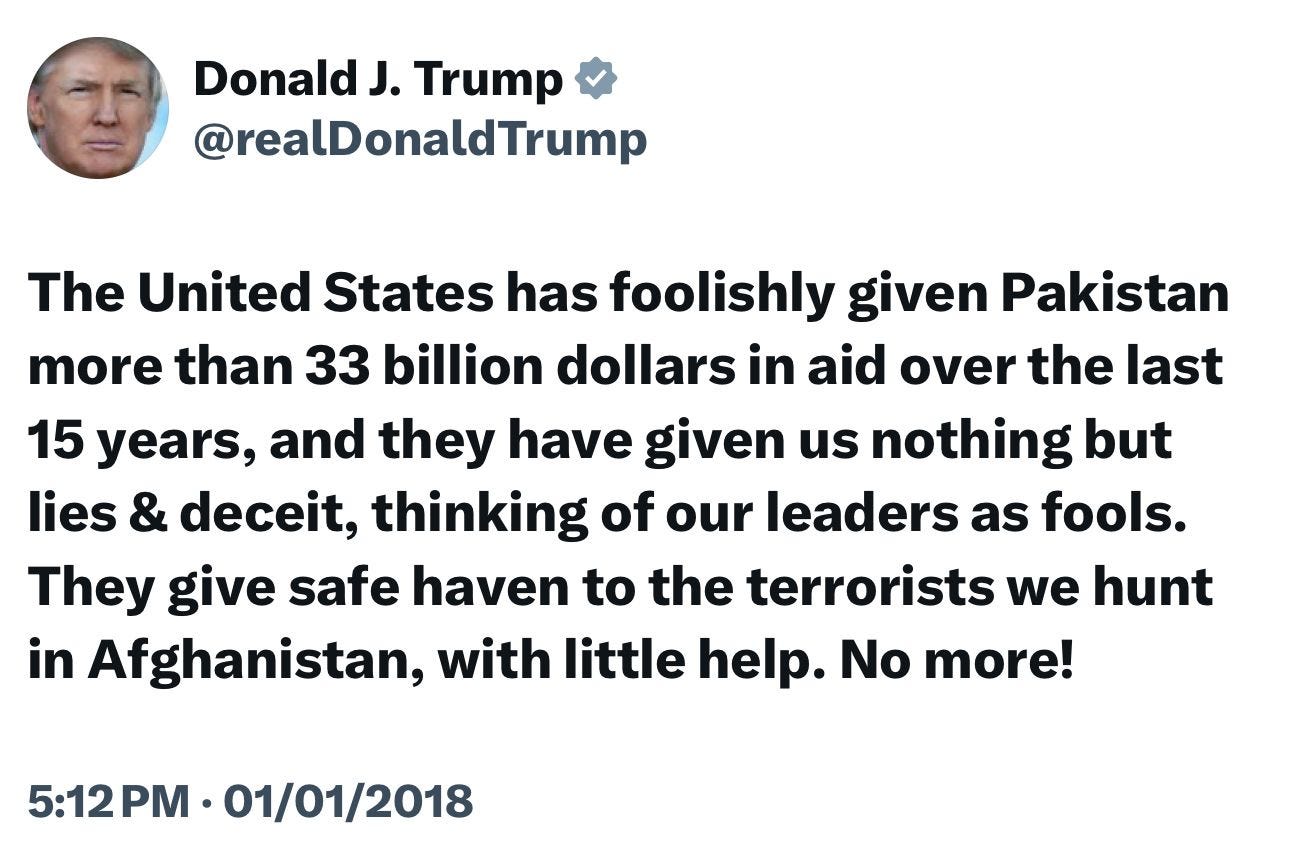The not-so-adorable US-Imran bromance
If Imran governs the popular narrative in Pakistan, Washington would want to govern him to advance its long-term interests. He is their go-to guy to blast the army, besiege the intelligence agencies..
If you want to decipher the dynamics of a burgeoning bromance between some members of the incoming Trump Administration and Imran Khan, then travel back a hundred-plus years to the land of the Pharaohs. Entombed in history is a quote by Lord Cromer, who, as Counsel-General, shaped British colonial policy towards Egypt. He had to manage the complexities of expanding influence in this slippery yet strategically significant part of the world. Egypt was technically under the Ottomans, and the British colonial competitors, the French, the Germans, and the Italians, also had an eye on it. The British expanded their military presence in Egypt under the pretense of suppressing a revolt, but their true motive was to protect their interests in the Suez Canal.
How to govern Egypt?
Cromer’s answer was brilliantly devious: “We don’t govern Egypt. We govern the governors of Egypt!”
This meant the British could use the existing system and allies in Egypt, including a former prime minister, to run the country as they pleased. Why deal with so many interests in Egypt, Lord Cromer crooned to himself, when we could do it through a proxy without much cost? This word in the sentence, “proxy”, is what you need to bear in mind when processing the amazing barrage of bipartisan support that is flowing for Imran in the US. And this despite the fact that Imran for years has raked Washington over the coals through his delusional diatribe of “Cypher Conspiracy”, triggering a long PR disaster for US diplomats in Pakistan who scurried around to save the US image from drowning in ‘Down with America’ slogans.
He styled himself as a Putin supporter and accused the Army high command of removing him from power to please the US, as he believed he was seen as being on the side of Moscow regarding the conflict in Ukraine. He collected fake fame through a fictional “absolutely not” to a notional US demand for military bases, which even his friend-in-dark-deeds, General Faiz, denied in a largely-attended background briefing. “No such demand was ever made by Washington”, is what the then ISI DG said. He manufactured empty promises like “haqiqi azadi from the US”, which sounded tempting and pleased those who repeated them, but had no substance. (However, the slogans—Haqiqi Azadi and Absolutely Not—made it to the T-shirts of his acolytes and can still be seen pasted at the back of rickety cars.)
What has made Imran, the public whacker of Washington, the new darling in the US?
Well, like the rulers of Cromer’s Egypt, Imran, potentially, presents a unique one-window opportunity to Washington to deal with a hard, recalcitrant nuclear state that it loves to hate but hates to leave because of its strategic location. A state that is the chummiest with Washington’s global challenge number 1, China, and which continues to threaten its Asia pivot, India. A state that has a deep friendship with deep-pocketed Saudis who rescue it financially, and which has survived not only the consequences of its own monumental mismanagement but also real external conspiracies to redraw its borders and cause it to implode. Pakistan of the 21st century has to be managed and kept under Washington’s influence like the Egypt of the late 19th.
But how?
The old US framework of engagement with Pakistan is of no use anymore. Influence peddling and policy modifications through helpful military dictators? Not workable either because a) China has too wide a support base in the Establishment to allow that space b) there is no military government in place c) the era of generous military aid is over. Trump, at any rate, wants to make ten dollars from every dime of aid spent abroad, and Pakistan does not fit the mode.
Remember what he said the last time he was in the Oval Office?
Sanctions?
Haven’t worked because when there is no significant military aid relationship, punitive actions don’t hurt. Consider the fact that the US has so far sanctioned 166 Pakistani entities related to its nuclear delivery systems and yet there is no impact. A global sanctions regime? That would require the kind of consensus-making that Trump is singularly incapable of pulling off. A president-elect who is threatening to take over neighboring countries’ territories (Panama) or musing to amalgamate them in his federation (Canada) or offering to buy them (Greenland) isn’t quite the salesman for world harmony and common goals. Also, Pakistan, while important, isn’t exactly the most immediate issue Washington has on its mind. It is a deep concern but on a slow policy boil.
The softer ingress in Pakistan—through civil society initiatives, flagship development programmes, elite enlistment through business, trade openings, even small-scale military training, and educational programmes?
Na, too limited to have a real lobbying effect. The CPEC isn’t going to collapse just because four hired guns are firing vlogs from abroad. Gwadar will not be rolled back because Fawad Chaudhary is tweeting against it.
Also, there are severe funding restrictions on these influence-enhancement tactics. Besides, their beneficiaries aren’t the real decision-makers.
What about using regional allies like India and non-state actors to squeeze the country’s borders to make the Establishment bend and bow? This only toughens the internal resolve to fight back and gives the Establishment a preponderant role in deciding policy. So counter-productive.
What to do then?
Rent a party. Buddy-booth with a national influencer. Ride with the popular sentiment. And if he has a track record of hate-mongering against the US, bother not. Remember the adage: it is better to have your enemy inside your tent peeing outwards then outside the tent shooting inwards. Imran Khan fits into this framework perfectly. His strategic charms for the US are many.
If Washington wants to curtail the Pakistan army’s policy influence regarding China, remove the Establishment from its high pedestal of national security guardianship, make the ISI look like a rogue institution, promote its own lobbies in civil and military bureaucracies, and eventually slow down Pakistan’s nuclear program and its delivery systems, it needs a way to manipulate the current system into eventually taking a pro-US shape. A handle that is handy, willing, popular, and provides the ultimate justification for intervening in the internal affairs of Pakistan on globally-acceptable grounds like human rights, democracy, free and fair elections, and an independent judiciary.
Imran is that handle. He has the additional advantage of being hugely popular with the youth. This means that whatever joint policy venture Washington can plan with Imran and the PTI, it can become a long-term investment in building the US image in a state that has historically been hysterical about the US acting like a master. Imran allows the US to connect at once with the ultra-liberals and the ultra-conservatives, with the Afghan Taliban and the local Grenells alike, with judges, trolls, women, the rich and the poor, with this generation, the last generation and the next generation.
If Imran governs the popular narrative in Pakistan, Washington would want to govern him to advance its long-term interests. He is their go-to guy to blast the army, besiege the intelligence agencies, isolate its rulers, and paint Pakistan as a country that is in immediate need of democratic rescue and not more nukes.
Reminder: Lord Cromer's policy of "governing the governors" in Egypt meant that he exercised control indirectly, through the existing Egyptian administration, rather than directly ruling the country. He took on the advisory role with the Khedive (the ruler of Egypt). He used this position to influence decision-making and shape policy. He oversaw Egypt's finances, ensuring that the country's budget and economic policies aligned with British interests. He exercised tremendous influence over the appointment of Egyptian officials, often selecting individuals who were British toadies.
However, his declared justification for every colonial act he carried out was always lofty, about higher ideals—about “modernizing, reforming Egypt”, about bringing its institutions like the judiciary at par with the new age. But in effect, he tied Egypt to the British apron strings and used it as a platform to push his countries' strategic interests. ‘Governing the governors of Egypt’ was a low-cost, high-yield stratagem that worked.







Imran is not a high IQ schemer..he is more of a glorified puppet hero who is quite at the mercy of his puppeteers who allow him enough hubris and mileage to make him appear autonomous and in control. Whether it is women in his life, his exes, generals and foreign powers, he thinks he is extracting his mileage off these but the mutual exploitation is heavily in the favour of the other parties that he is enough of 'semi autonomous puppet'...call him 'SAP'.
Yes Trump is correct. You are part of the problem of enabling the loot of Pakistan by the Military Generals, Zardaris and Sharifs who have been looting US funds, IMF Funds.